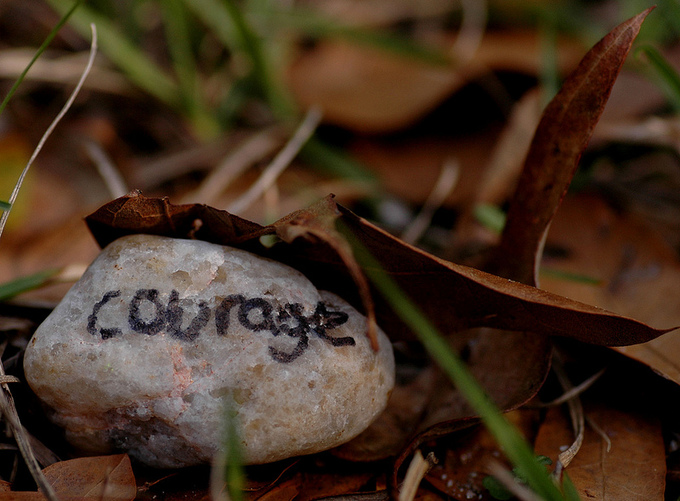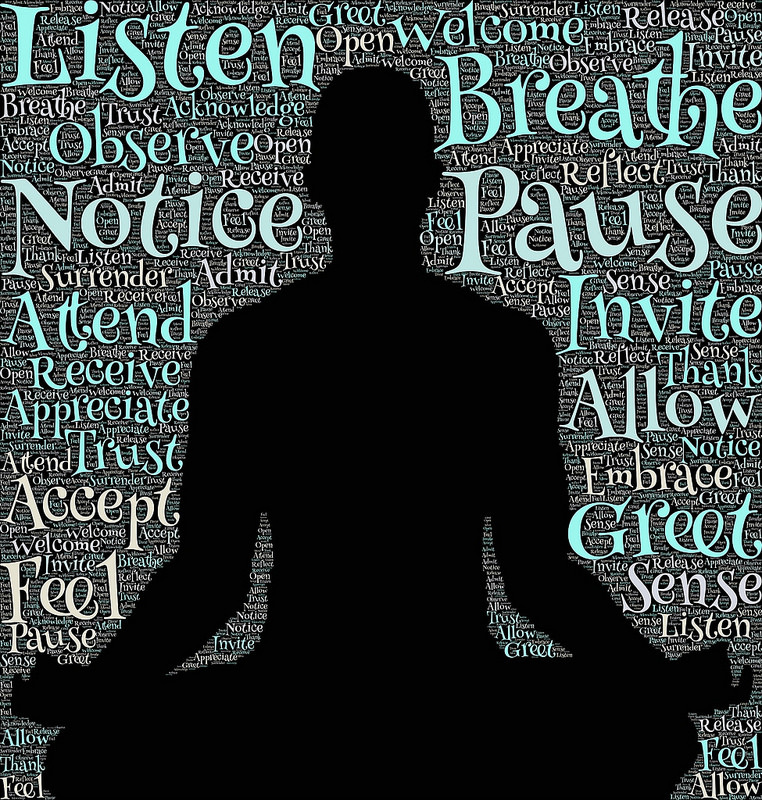
In the dim background of our mind, we know what we ought to be doing but somehow we
cannot start. -William James You’ve made what seems like a hundred false starts and you feel like you’ll never be able to make a living doing what you love. Whether you want to start your own business or change careers, you find that you just don’t know where to begin anymore and the advice to just start rings hollow in your ears. So now what? Well, it is possible to do this. I’m living proof. I spent years spinning my wheels and getting nowhere fast. Now I’m in the flow of forward motion. I’m scared and there are days I want to run and hide, but I don’t. I keep moving. That’s key. To keep moving. It’s so much harder to start again and again. So let me share with you the things you need to do before you get started. Our starts often don’t work because we haven’t laid the ground work. Free Up Time and Energy If you’re anything like me, you’ve said yes to too many projects and volunteer opportunities. Or maybe you have children or other family members to look after. All are important, but so are you. You need to make room in your life for your dreams. Even if it’s 15 minutes a day to start. And the way to do this is take away as many excuses as possible. Since the beginning of this year I’ve been slowly finding others who could take over some of my volunteer duties. I’m still working on clearing my path to make room for the time and energy I need to build my business, but I have freed up quite a bit of it. What can you clear from your schedule? Can you get a babysitter for an hour? Is it possible to drop one activity from your child’s schedule? Do you have to volunteer for three things at once? Can a family member cook or do laundry? Talk to Your Family and Friends Let the people in your life know what you’re up to. Tell them about your hopes and dreams if you think it’s safe to do so. It’s important to only share with those who will support you because in the beginning it’s challenging enough without bad vibes to throw you off track. You do this to get support. You need the cheerleaders and accountability as well as the physical help for the things mentioned above. No one lives up to their greatness without help. Get the help you need and the best place to start is at home. Get Professional Support Now maybe you can’t afford a business or life coach, but start thinking about it. If you can’t hire someone just yet, then start to surround yourself with people who are working towards similar goals or are doing what you want to do. Find a mentor and or join an accountability group. This is so important. It can make all the difference as you move along your path. Make Sure Your Dream Sets You on Fire Sometimes we’ve been dreaming for so long about something that we don’t realize our feelings have changed. Maybe you’ve dreamed of being a reporter and winning the Pulitzer. But when you start to move in that direction you find that you’re not fired up about it so much anymore. We change and so do our dreams. I believe our life purpose is something broader than being a reporter or doctor or coach. It’s an overarching theme that we’ve been living all along. See my blog 5 Ways to Discover or Get Clear on Your Calling and do some work on getting clear on what it is you really want to do to express your life purpose. You’ll need the fire of doing something you absolutely love to keep going. When you are actually ready to make your start, here are a couple of things to keep in mind: Begin with Something You Love I think it’s important to build a strong foundation, but those tasks may bore you. If you’re starting a business you need to do some market research. If you’re changing careers you may need to go back to school. Some of these things you may love and some you may not. Make the first thing you do something that fires you up, something that is at the heart of your dream. If you do something that makes you feel like you’re already living your dream, you will feel motivated to keep going. Start Small Often the reason you don’t start is because you are overwhelmed by a long list of tasks. Pick something you love, like mentioned above, and then put away the rest of the list for now. Take your one task and break it down into steps and make a plan. Plan to do one step in that hour you freed up by hiring a babysitter or by getting a family member to do the laundry. When you’ve completed that first step of a single task, make a plan for when you’ll do the next step and then celebrate. Once you’ve begun keep going by keeping it simple. You’ll get there as long as you keep moving forward.
0 Comments
“To pay attention, this is our endless and proper work.”
― Mary Oliver You know how it is when you’ve got 10 things to do and then find yourself distracted by Facebook or Twitter. After an hour goes by you kick yourself for wasting time and then spend the next 20 minutes trying to figure out which task to tackle. And the thing is you’ve even done some study of time management. WTH! Why do we let our attention get hijacked by all those things that won’t get us closer to accomplishing our goals? Sometimes it’s procrastination brought on by fear of failure or success. Sometimes we’re tired. And sometimes we’re just so overwhelmed that it’s easier to goof off than try to get through our long list of things to do. No matter what reason we have for getting distracted, we can always bring our attention back to the present moment. With practice we can become aware that we’re distracted and leave Facebook after only a few minutes instead of wasting a whole hour or two. Our mind likes to think and jump all over the place sometimes. That’s okay. Paying attention isn’t about being able to stay on task so much as it’s about being able to come back to the task after being pulled away. What I just described is mindfulness. I practice mindfulness meditation most days and have learned to carry the practice into my everyday life. I practice staying aware of where my attention is and then placing it where I want it. So don’t get mad at yourself for getting distracted. Instead, practice coming back to the task at hand and continue. No judgement, just return. And if you find yourself getting angry that you got distracted or you became aware that your attention was averted for a long time, acknowledge your anger, don’t repress it. Just notice. Usually awareness takes the sting out of feelings. Accept the anger as a part of you. Let it be heard. Write down how you’re feeling even to help you get some distance from it. At some point you’ll notice that a part of you is watching the whole process. Put your attention there. This observer is your higher self. Let it guide you. Success is in the practice of paying attention and in the willingness to stay open to what is right in front of you. If you’d like to learn about and practice mindfulness meditation, I recommend joining Susan Piver’s Open Heart Project. She’s a wonderful teacher and the practice will help you live a more meaningful and successful life.  There is something that you feel is yours to do in the world. It feels like it’s so close and yet so far. It’s not easy to grasp for some of us. And you can have more than one calling in a lifetime. Why is it that some people are born knowing what they are here to do and others seem to always be searching? I think it’s because some callings have a ready form to fit into and some don’t. For instance, my step-son seems to have always known he was a musician and specifically a guitarist. He had fine motor skills as a baby and when he finally got a guitar in his hand at 12 he was off and running. He’s a death metal guitarist with his own band and they have four albums to date. Some of us have a calling that doesn’t have a ready-made mold or one that is rather nebulous. And some of us have to create the mold which can cause confusion and difficulty in pinning it down. To add to the confusion a calling is often bigger than simply expressing as a musician, minister or life coach. Someone called to heal could be a doctor, minister, herbalist, Reiki Master, life coach, etc. For instance, I feel called to empower and inspire people. I’ve tried on many hats in which I did these things, but it wasn’t until recently I finally found one that fit. There have always been clues, though. I just happened to be a little slow at actually following my intuition since I have a strong connection to my logical brain. But my intuition is hearty and wouldn’t let me ignore it forever. To help you move through the confusion here are some ways to gain clarity on your calling. Revisit your childhood I think this is one the best ways to gain clarity on your calling. Our childhoods are rich with clues. Get a pen and paper and start writing about all the things you loved to do as a child. And I mean loved to do. You’re going to use that blissful feeling to help you get clear on your calling. This needs to done as if you’re writing an essay or story. Just writing a list can stunt the process of gaining access to all the nuances, feelings and little clues that are in your memory. Once you have written a couple of pages, you can create a list to help you see any patterns. Often one will emerge. Now ask yourself if you still do any of these things. Think hard on this because you may still do them, but in a slightly different form. If you don’t, ask yourself why that is. With one or a few things now brought forth from your memory see if there is a pattern or if the one thing is specific see if it applies to an overarching theme. For instance, I remember that I enjoyed making up stories with my dolls and later I wrote them in my head and on paper, I loved to learn and pretend I was in school as both teacher and student, and I was endlessly curious about the spiritual world. Telling stories was a way to understand the world as well as inspire and empower others. Playing school was a way to learn more and empower others by teaching them what I learned. My curiosity about the spiritual world was about learning so I could tell people about it. I always wanted to learn and then teach. My calling is to inspire and empower. Explore your life now Some people have a hard time digging around in their past. You don’t have to go there in order to discover or get clear on your calling. You can look at the present and see the clues. This is kind of like the exercise above except you stick to what you do now. It’s okay to go back to 10 years ago when you used to hike or bike or did something that you loved, but for some reason no longer do. Again write it as an essay or story. This time think of those things that truly put you in the flow. Flow is a mental state of pure concentration in the moment on what you’re doing. It’s happiness in action. Mihaly Csikszentmihalyi, a professor of psychology and management, created the notion of flow. You’ve probably felt it when doing something so well that you seemed to do it effortlessly and lost track of time. Pull from your story or essay those things where you get in the flow. What patterns do you see? What stands out? Do you see an overarching theme? Your calling is something that puts you in the flow, makes you happy and is something you would do even if you never got paid. In fact you’re probably doing it at the higher theme level now even if you don’t think you know your calling. It’s just harder to pinpoint at that level. Do a visioning Visioning is not about experiencing an inner picture of what you would like. Visioning is a process of going within and surrendering to what the highest outcome is to be for yourself or any project. It’s being open to Spirit and the messages that come through. These messages can be in the form of words, phrases, images or feelings. You then take what you receive and see how it can be implemented in your life. You do this process by getting centered and ready to receive. Then you answer four key questions:
Receive answers to each question individually letting what needs to come through to come through. Stop and go to your receptive mode in between each question. Once finished, take time to contemplate your answers until you see how you may implement. Take a typology test Aptitude tests or typology tests like the Myers Briggs certainly don’t tell you exactly what you’re capable of, but they can help you see patterns and give you some ideas. Only take from it what resonates. Take the Myers Briggs test here. Visit the future Do a self-guided meditation where you imagine your life 10 years from now. The distance from the present will allow your mind to move into daydream or pretend mode where you’re freer to let loose. This envisioning process has a little bit of the message from Spirit that visioning does as well as your own ideas and feelings. Of course, when we’re in alignment, these two are the same. Ask yourself:
All of these processes will bring your calling further into the light. Sometimes you’ll have that A-ha! moment and sometimes you’ll need more time to ruminate. Talking with someone who can be objective can help you get clear faster. And doing more than one of these can help, too. Let me know what you come up with. If you get stuck, feel free to contact me for a free Heart-to-heart session. No strings attached.  “When you find your path, you must ignore fear. You need to have the courage to risk mistakes. But once you are on that road... run, run, run, and don't stop til you've reached its end.” ― José N. Harris The word courage comes from the Latin cor and the Old French coer which denotes the heart as the seat of feelings. I love Brené Brown’s definition in this TED Talk: Courage is to tell the story of who you are with your whole heart. The key is to connect to your heart and innermost feelings and then be willing to be vulnerable and share who you are. When we finally decide that we’re not going to live a life void of meaning anymore. When we decide that we want to love our lives and make a contribution to the world. We start to move and often we come up against resistance. Most humans are not fans of change. We’re creatures of habit. Habits are not a bad thing unless the behavior is causing us pain or getting in the way of our goals. Habits help us to routinely brush our teeth, get to work on time, exercise regularly, etc. Many of us humans like the familiar. When we try to change a behavior we balk. It feels like so much work. Even if we’re trying to change our lives in a way that matches our dream life, that sluggish feeling can show up. So what can you do to develop this thing called courage? First get in touch with your heart and with who you really are. Ask: What brings me joy? What are the activities in which I lose myself? Begin to tell the story of who you are with your whole heart and be willing to share it with others. Be your authentic self. Next, create a vision of your new life and make sure that it encompasses who you are and not what you think it should look like based on what others have or say. This vision will be your pull, the thing that draws you forward. Now, because many of us are creatures of habit you may need to go deep inside your pain points. These are your reasons for wanting to change, the things that push you into your dream life. I learned this from Tony Robbins. Take some time to really feel the pain. For instance, if you’re trying to move towards the dream of being a coach or painter you could go deep into how bad you feel ignoring that side of you. Maybe you think about how small your life is, how bored you are at your current job and how much you hate wasting your life. Let the pain push you away from the life you don’t want towards the one you do want. Here are some more tools you can use to continue to develop your courage and stay persistent on your path. Make small changes Sometimes we’re ready to take the leap. We feel excited and make a big change like quit our job or put out big bucks on a coach. These can be great catalysts, but often we lose our momentum when it comes to doing the actual work. To keep going or to simply begin you can make small changes, easy commitments that will keep you moving forward. Make it simple so you’ll do it. These small changes prime you for larger ones. A big leap will then have a foundation under it in both a physical way and feeling way. For example, you decide to not just quit your job, which can feel euphoric at first but fearful later. You create a plan and make small changes like saving a little money for when you leave and building your confidence by doing some research and trying out the new work you plan on doing. Momentum builds and when you leave your job you know you have a good chance of making it work, which keeps you motivated. Being broke can motivate you, as well, but often it just puts you in fear mode and unable to think straight. It’s still possible to make it, but it may mean more hustle than you’d like. Put the As If Principle to work for you In my last blog I wrote about the book “The As If Principle” by Richard Wiseman. In it he talks about how our bodies and behaviors can create feelings in us and how that can be more effective than just changing our thinking. I think using both ways is best, but here are some ways you can use your body to help you persist through change. Tense your muscles. This makes you feel like you’re working hard. Studies showed that people who did this persisted longer at solving a puzzle or other difficult tasks. Cross your arms. This pose also helped people to persist longer at a task. It is acting as if you’re persistent. Sit up straight. This also helps you to keep you going. Studies showed that people who sat up straight for three minutes and then were told to solve a puzzle spent twice as much time trying to solve it as people who were told to slouch. Do something different. This technique convinces us that we’re not creatures of habit. The thing you do differently doesn’t even have to be related to your new life. It just has to be a change to something that you do habitually. For instance, take a different route to work or change up your morning routine. What studies showed is people who did something different changed how they viewed themselves. They no longer saw themselves as someone who blindly follows a routine but as someone who was able to take control of their lives. Use your mind Many of you have heard the saying: Change your thinking, change your life. It does work. Use affirmations. An affirmation is a statement that affirms something you want to see in your life. For instance you can say: I am a successful coach. Make the statement positive and in the present tense. Now maybe you don’t believe that yet and so you find your mind going into a negative affirmation: I’m no good at coaching or I don’t know enough. First ask yourself if this is true. It’s good to be realistic. The truth may be that you don’t know if you’re good because you haven’t tried. Maybe you need to get some training or practice. Do it and continue to affirm that you are successful at it. Envision your new life. By using your mind to envision your new life you create an opening for it to manifest. Make sure to use all of your senses and really feel how good it will be. One of the reasons this works is because it has been shown that our brains don’t make a distinction between practicing something in real life or in our minds. We can spend a few minutes every day “practicing” our new life and it will seem to our brains that we’re living it. This will help you embody the change faster. I hope you found this helpful and will continue to gain momentum in moving towards your dreams. If you loved this post, please share everywhere online. And if you have any friends who you think might benefit from these tips, please feel free to pass it along. Be sure to share your own tips in the comments below. I’d love to hear from you. |
Brick by Brick
A soul journey. Building a life
|


 RSS Feed
RSS Feed
